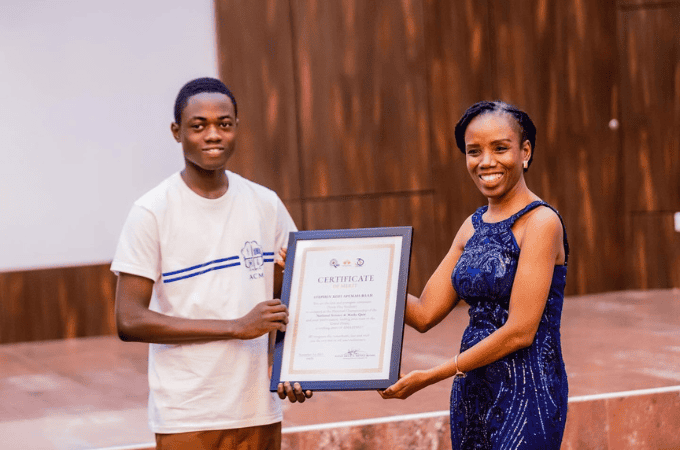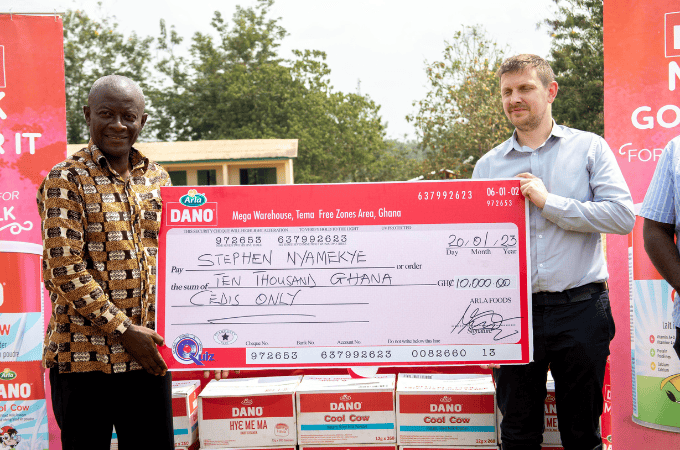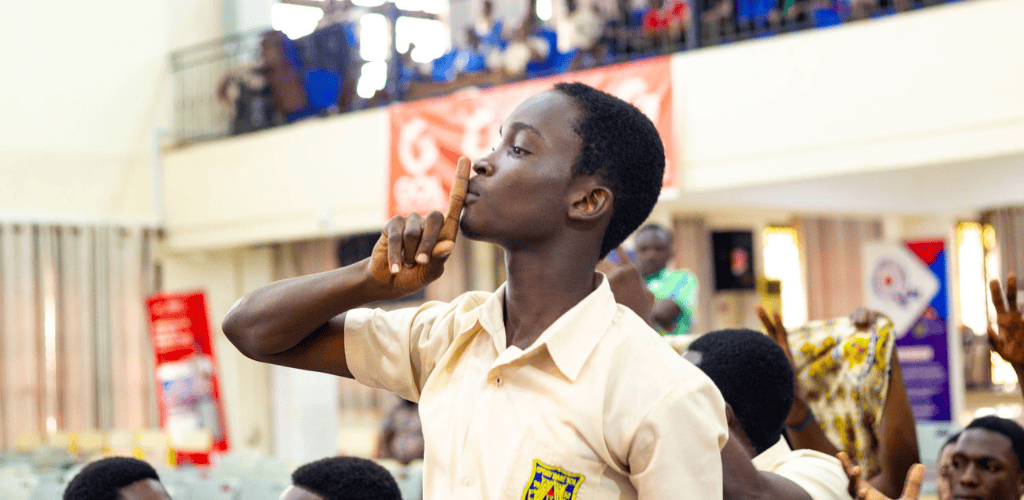During a recent interview hosted by Goshers under High School Africa, Richlove Oduro, a final-year student at Nsein SHS, stirred controversy with her remarks about the nation’s prestigious National Science and Maths Quiz (NSMQ). Including
the Science and Maths Quiz is a show,
her candid and bold submissions have ignited discussions about the true value of the competition, especially on social media, where many have weighed in on the debate. The ongoing discourse eventually prompted another interview, during which Richlove clarified her earlier points and reaffirmed some of her original claims.
While many find Richlove’s bold and outspoken nature commendable, her views have not been universally well-received. As with nearly every opinion, the ongoing debate is marked by a clear divide: supporters who wish to amplify her sentiments, detractors who view her thoughts as misleading and unworthy of attention, and a third group that acknowledges the validity of some points while challenging others.
Ultimately, a critical and objective stance on the ongoing discourse surrounding the true value of the NSMQ competition requires thoughtful consideration of the competition’s vision and goals.

The NSMQ, established in 1993 by Primetime Limited, aims to promote the study of science and mathematics among senior high school students in Ghana. The competition seeks to encourage academic excellence, intellectual curiosity, and problem-solving skills among the youth. It strives to unearth young scholarly talent and foster healthy rivalries among Ghana’s senior high schools. In pursuit of these objectives, the NSMQ has gained recognition from international organizations, including the West African Examinations Council (WAEC), and has received several awards.
Considering this, it is reasonable to assert that the NSMQ is not only successfully fulfilling its overarching goals and vision but perhaps even exceeding them. As a competition that has been running independently for over thirty years, it continues to deliver excellently on its unique proposition.
With each passing edition, the NSMQ continues to evolve and improve, maintaining its reputation for excellence and showcasing the intellectual prowess of Ghana’s youth. Its rise to the status of the most anticipated and prestigious senior high school competition in the country is a testament to its remarkable impact.

Take, for instance, the promotion of science and mathematics in Ghana. Although specific data may not be readily available, the competition has sparked a passion for these subjects among many students, some of whom developed this interest even before transitioning from junior to senior years. A stark example, Stephen Apemah Baah, the SHS 1 student who led OWASS to the 2023 NSMQ final, shared:
I got interested in the NSMQ when I was in Junior High School.
The NSMQ has also served as a pivotal platform for unveiling bright minds while successfully creating healthy rivalries amongst high schools.
Despite these successes, the competition has faced several criticisms over the years. However, it appears that many of these criticisms stem from a misunderstanding—or perhaps ignorance—of its overarching goals or a disregard for them. Notable among these criticisms are concerns about the competition’s contribution to ‘national development.’ While the competition is not above criticism, it is fair to evaluate it based on its intended purpose and the unique value it promises, rather than personal sentiments or expectations. After all, it would be unreasonable to fault a knife for being ineffective at clearing a farm.
For the many who assess the essence of the NSMQ competition solely through the lens of ‘national development,’ it is important to appreciate that the competition is not a cure-all for Ghana’s myriad developmental challenges; in fact, it was never intended to be. The economic, social, and environmental challenges of the country are too vast to be addressed by a single annual event. Notwithstanding, through its predefined goals and visions—and beyond them—the NSMQ continues to make significant contributions to the nation’s development, both directly and indirectly, in various notable ways.

Consider the resources and opportunities provided, both in cash and kind, to participating students and schools. Notable participants like Francisca Lamini have, through the competition, secured scholarships worth thousands of dollars. Additionally, schools have have received funding to upgrade their facilities, thereby enhancing the quality of education provided to students, not to mention the prime benefit of inspiring and nurturing young minds in STEM fields. Although these benefits may not be equally distributed among all participating students or schools, they still have direct and indirect influence on the nation’s development.
The NSMQ is not alone in this conversation; several other senior high school competitions hosted in the country are prone to misplaced criticisms. From the National Business Pitch Competition, hosted annually by Junior Achievement Ghana, to the National High School Debate, organized by Pepsodent and Luv FM, these events are aligned with specific visions and goals. They offer distinct value propositions for participants and the nation at large—whether it’s empowering start-up businesses or fostering critical thinking and public speaking among students.
Every competition holds a unique place and should be appreciated accordingly.
While the tangible, measurable impact—whether economic, social, or environmental—of these competitions, both within their predefined vision and goals and beyond, may not be immediately obvious, especially to non-participating schools and students, their impact nonetheless is undeniable. Although the limitations, flaws and potential downsides of these competitions are worth acknowledging, it is evident that the positives outweigh the negatives. With their demonstrated commitment to learning and improvement, it is certain that the negatives associated with these competitions will be addressed with time.
To reiterate, the effectiveness or otherwise of these competitions should be evaluated in the context of their intended purpose and the unique value they promise to offer, rather than on personal sentiments and expectations. Although critiques from students, educators, and citizens are crucial for the ongoing improvement of these events, they are most constructive when aligned with the competition’s goals and vision. To conclude, it is clear that the NSMQ, along with other similar competitions, occupies a unique and valuable place. Therefore, Ghanaians are encouraged to appreciate these competitions for their distinct contributions to both participants and society as a whole.







9 Comments. Leave new
Your house is valueble for me. Thanks!…
I’m still learning from you, while I’m making my way to the top as well. I absolutely love reading all that is posted on your blog.Keep the information coming. I liked it!
NSMQ has had great impact, even the excitement it brings to old students.
Convinsive writing. You outlined the positive effects of NSMQ
Wow well understood ….!
This is very informative and convincing! An excellent write-up.
Great piece!
Great piece. Well-written rebuttal! You successfully showcased the positives of NSMQ, emphasizing its role in fostering critical thinking, teamwork, and academic achievement. Your thoughtful perspective encourages readers to look beyond criticisms and celebrate the pursuit of excellence that NSMQ embodies.
Beautiful write up. NSMQ is achieving its intended purpose